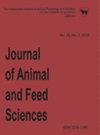Evaluation of distillers dried grains with solubles to partially replace soybean meal in the diet of growing-finishing pigs
IF 1.5
4区 农林科学
Q3 AGRICULTURE, DAIRY & ANIMAL SCIENCE
引用次数: 1
Abstract
This study was conducted to evaluate the effect of dietary supplementation with increasing levels of distillers dried grains with solubles (DDGS) on growth performance, nutrient digestibility, and carcass quality of growing-finishing pigs. The experiment was divided into 2 phases (Grower and Finisher) in a 16-week trial. A total of 120 [(Landrace × Yorkshire) × Duroc] growing pigs (BW; 22.02 ± 0.08 kg) were randomly assigned to control (CON) and treatment diets (TRT): CON – basal diet, DDGS 4% for growing pigs and 6% for finishing pigs; TRT1 – DDGS 10% for growing pigs and 12% for finishing pigs and TRT2 – DDGS 15% for growing and finishing pigs. Increasing dietary DDGS supplementation did not cause significant linear or quadratic responses in average daily gain (ADG), average daily feed intake (ADFI) and feed conversion ratio (FCR). Furthermore, DDGS inclusion did not result in linear or quadratic effects on the digestibility of dry matter (DM), nitrogen (N), and digestible energy (E). Backfat thickness (BFT) tended to decrease (quadratic, P = 0.057) at week 16, whereas lean meat percentage (LMP) was unaffected by increasing DDGS levels in the diets. Thus, the addition of increasing DDGS levels (4–15%) to the basal diet showed no adverse effect on the growth performance, nutrient digestibility, and positively affected carcass quality of growing-finishing pigs, suggesting that DDGS (4–15%) inclusion exerted comparable effects to soybean meal, i.e. the main source of protein, thereby reducing feed cost.酒糟干颗粒与可溶物在生长肥育猪日粮中部分替代豆粕的研究
本试验旨在研究饲粮中添加一定水平的酒糟干颗粒及可溶物(DDGS)对生长育肥猪生长性能、营养物质消化率和胴体品质的影响。试验分为育成期和育成期,为期16周。共120头[(长白×大)×杜洛克]生长猪(BW;(22.02±0.08 kg),随机分为对照饲粮(CON)和处理饲粮(TRT):对照基础饲粮,生长猪DDGS为4%,育肥猪DDGS为6%;TRT1 - DDGS为生长猪10%,育肥猪12%,TRT2 - DDGS为生长猪和育肥猪15%。饲粮DDGS添加量增加对平均日增重(ADG)、平均日采食量(ADFI)和饲料系数(FCR)无显著的线性或二次响应。此外,添加DDGS对干物质(DM)、氮(N)和消化能(E)的消化率没有线性或二次效应。16周时背膘厚(BFT)有降低的趋势(二次效应,P = 0.057),而瘦肉率(LMP)不受DDGS添加水平的影响。由此可见,在基础饲粮中增加DDGS水平(4-15%)对生长育肥猪的生长性能和营养物质消化率没有不利影响,反而对胴体质量有积极影响,说明添加DDGS(4-15%)与豆粕(主要蛋白质来源)具有相当的效果,从而降低了饲料成本。
本文章由计算机程序翻译,如有差异,请以英文原文为准。
求助全文
约1分钟内获得全文
求助全文
来源期刊

Journal of Animal and Feed Sciences
农林科学-奶制品与动物科学
CiteScore
2.10
自引率
0.00%
发文量
42
审稿时长
3 months
期刊介绍:
Journal of Animal and Feed Sciences (JAFS, J. Anim. Feed Sci.) has been published by the Kielanowski Institute of Animal Physiology and Nutrition, Polish Academy of Sciences in Jabłonna (Poland) since 1991. It is a continuation of the Polish-language journal Roczniki Nauk Rolniczych. Seria B, Zootechniczna published by the Polish Academy of Sciences since 1969.
JAFS is an international scientific journal published quarterly, about 40 papers per year including original papers, short communications and occasionally reviews. All papers are peer-reviewed and related to basic and applied researches in the field of animal breeding and genetics, physiology of nutrition, animal feeding, feed technology and food preservation. The journal distinguishes the multidisciplinary nature of physiological and nutritional sciences and so includes papers specialized in all fields connected with animal well-being, including molecular and cell biology and the emerging area of genetics.
 求助内容:
求助内容: 应助结果提醒方式:
应助结果提醒方式:


